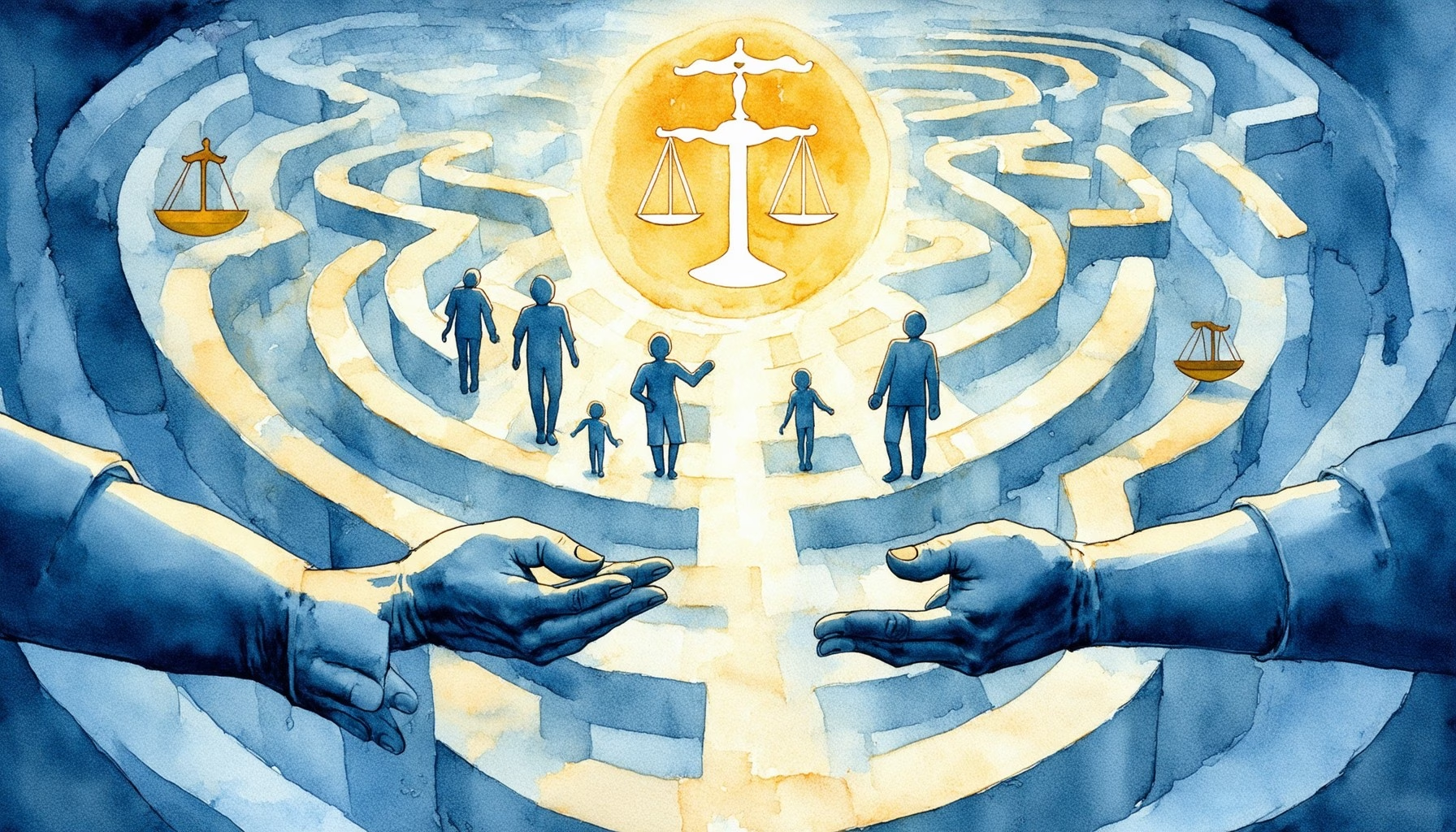Key Takeaways
- Explore legal aid options for free or low-cost legal services tailored for low-income families facing family court challenges.
- Understand the term indigent, which refers to individuals unable to afford legal representation, qualifying them for legal assistance.
- Access pro bono programs where attorneys volunteer their services, providing crucial support for family law matters.
- Utilize law school clinics that offer free legal help from students under professional supervision, ideal for family law issues.
- Consider free legal advice hotlines available 24/7 for immediate support and guidance on family court matters.
- Check income eligibility requirements, often set at 125% to 200% of the federal poverty level, to qualify for legal assistance free.
Are you facing the daunting challenge of navigating family court without the financial means to hire a lawyer? If so, you’re not alone. Many low-income families find themselves asking, how do I get a free lawyer for family court? This article aims to provide essential tips and insights into the various options available for securing legal assistance without the burden of high costs. We will explore what it means when you can’t afford a lawyer, the maximum income limits to qualify for legal aid, and the resources available for free legal advice. Additionally, we will discuss specialized support for mothers seeking child custody, as well as how to access free attorney services and legal assistance for divorce. Whether you need immediate support through a free legal advice hotline or are looking for community-based options, this guide will equip you with the knowledge to find the help you need. Join us as we delve into the world of free lawyers for low-income families and uncover the pathways to achieving justice without financial strain.
How do I get a free lawyer for family court?
Accessing legal representation in family court can be challenging, especially for those facing financial constraints. Fortunately, there are several avenues available for individuals seeking free lawyers for low-income families. Understanding these options is crucial for navigating the complexities of family law without incurring significant costs.
What is it called when you can’t afford a lawyer?
When someone cannot afford a lawyer, they are often referred to as indigent. This term is widely used in the legal system to describe individuals who lack the financial resources to secure legal representation. In criminal cases, courts typically appoint a public defender to represent indigent defendants, ensuring their right to legal counsel as mandated by the Sixth Amendment of the U.S. Constitution.
Additionally, Legal Aid encompasses various organizations and programs that offer free or low-cost legal services to those who cannot afford a private attorney. These organizations are often funded through government grants, private donations, and nonprofit initiatives. Legal aid can cover a range of issues, including family law, housing disputes, and immigration matters.
Another relevant term is Pro Bono, which refers to legal services provided voluntarily and without charge by attorneys to individuals who cannot afford legal representation. While pro bono work is not specifically tied to indigence, it plays a crucial role in bridging the gap for those in need of legal assistance.
For individuals who do not qualify for legal aid or public defender services, Self-Representation becomes a necessary option. This means they must represent themselves in court, which can be particularly challenging in complex legal matters. Resources such as court self-help centers and online legal information can assist self-represented litigants, but navigating the legal system without professional guidance can be daunting.
Free lawyers for low-income families: Understanding Your Options
There are several resources available for low-income families seeking legal assistance. Here are some options to consider:
- Legal Aid Societies: Many states have legal aid societies that provide free legal services to low-income individuals. These organizations can assist with family law issues, including divorce and child custody. To find a legal aid society near you, visit the Legal Services Corporation.
- Pro Bono Programs: Many law firms and individual attorneys offer pro bono services to those in need. You can check with local bar associations for lists of attorneys willing to provide free legal help.
- Law School Clinics: Some law schools have legal clinics where law students provide free legal assistance under the supervision of licensed attorneys. This can be a valuable resource for low-income families.
- Nonprofit Organizations: Various nonprofits focus on specific legal issues, such as domestic violence or child welfare. These organizations often provide free legal services or can connect you with resources.
For more information on accessing free legal services and understanding your rights, consider visiting this resource.

What is it called when you can’t afford a lawyer?
When you can’t afford a lawyer, you may be eligible for legal aid or pro bono services. Legal aid refers to free or low-cost legal assistance provided to individuals who meet specific income requirements. Pro bono services are offered by lawyers who volunteer their time to help those in need without charge. These options are crucial for individuals facing legal challenges, particularly in family court, where issues such as custody, divorce, and child support are at stake.
To qualify for legal aid, you typically need to demonstrate that your income falls below a certain threshold, which varies by state. Organizations like the Legal Services Corporation can provide information on eligibility criteria and available resources. Additionally, many local bar associations offer pro bono programs that can connect you with free family lawyers who specialize in family law matters.
Free lawyers for low-income families: Understanding Your Options
For low-income families seeking legal assistance, there are several options available to access free legal services. Understanding these resources can help you navigate the complexities of family court without incurring significant financial burdens.
What is the maximum income to qualify for legal aid?
The maximum income to qualify for legal aid varies by state and is typically set as a percentage of the federal poverty level. For example, many states allow individuals and families earning up to 125% or 200% of the federal poverty line to qualify for assistance. To determine your eligibility, you can visit the Legal Services Corporation website or contact local legal aid offices for specific income guidelines.
Free legal advice hotline 24/7: Accessing Immediate Support
If you need immediate legal advice, many organizations offer free legal advice hotlines that operate 24/7. These hotlines can connect you with experienced attorneys who can provide guidance on your situation. Utilizing these resources can be an excellent first step in understanding your rights and options. For instance, the Nolo Legal Encyclopedia provides valuable information and resources for individuals seeking legal assistance.
Free lawyers for low-income families: Understanding Your Options
When facing family court issues, many individuals wonder, how do I get a free lawyer for family court? Fortunately, there are several avenues available for low-income families seeking legal assistance. Understanding these options can empower you to navigate the legal system without the burden of high costs.
What is the maximum income to qualify for legal aid?
Legal aid organizations typically set income limits based on the federal poverty guidelines. For most programs, your household income must be at or below 125% of the federal poverty level to qualify for legal assistance free. This means that for a family of four, the income limit would be around $34,000 annually. However, these thresholds can vary by state and specific legal aid programs, so it’s essential to check with local legal aid offices for precise figures.
Free legal advice hotline 24/7: Accessing Immediate Support
If you need immediate assistance, consider reaching out to a free legal advice hotline. These hotlines provide 24/7 support, connecting you with legal professionals who can offer guidance on family law matters. Many organizations, such as the Legal Services Corporation, provide resources and can direct you to local services. Utilizing these hotlines can be a crucial first step in understanding your rights and options without incurring costs.
Free Lawyers for Low-Income Families: Understanding Your Options
When facing family court issues, many individuals wonder, how do I get a free lawyer for family court? Fortunately, there are several resources available for those who cannot afford legal representation. Understanding these options can help you navigate the complexities of family law without the financial burden.
What is the Maximum Income to Qualify for Legal Aid?
Legal aid programs typically have income eligibility requirements that vary by state. Generally, to qualify for legal assistance free, your income must fall below a certain threshold, often set at 125% to 200% of the federal poverty level. For example, in 2025, a family of four would need to earn less than approximately $35,000 to $60,000 annually, depending on the state. To find specific income limits for your area, visit the Legal Services Corporation for comprehensive information.
Free Legal Advice Hotline 24/7: Accessing Immediate Support
If you need immediate assistance, consider calling a free legal advice hotline. These hotlines provide access to law advice free and can connect you with free attorneys who specialize in family law. Many organizations offer 24/7 support, ensuring you can get help whenever you need it. For instance, the American Bar Association has resources that can guide you to local hotlines and legal aid services.

Free Lawyers for Low-Income Families: Understanding Your Options
When navigating family court, many individuals wonder, how do I get a free lawyer for family court? Fortunately, there are several avenues available for low-income families seeking legal assistance. Understanding these options can empower you to secure the support you need without incurring financial strain.
What is the Maximum Income to Qualify for Legal Aid?
The maximum income to qualify for legal aid varies by state and the type of legal assistance required. For example, in Alberta, individuals applying for legal aid representation may qualify if their gross income is up to $30,000. This threshold applies to eligible cases in criminal, family, and immigration law. It’s essential to note that legal aid programs often consider household size and specific circumstances, which can affect eligibility. Larger families may have higher income limits, and applicants must demonstrate a financial need for legal services.
For the most accurate and updated information regarding legal aid eligibility, including potential changes in income thresholds, consult the official website of Legal Services Corporation or relevant government resources. These sources provide comprehensive guidelines and can help individuals understand their rights and options regarding legal representation.
Free Legal Advice Hotline 24/7: Accessing Immediate Support
If you need immediate assistance, consider utilizing a free legal advice hotline. These hotlines offer 24/7 support, connecting you with legal professionals who can provide guidance on family law matters. This service is particularly beneficial for those who cannot afford traditional legal fees. Many organizations, such as the American Bar Association, provide resources and hotlines that can help you navigate your legal challenges.
Additionally, local legal aid offices often have hotlines that can assist with specific inquiries related to family court. By reaching out, you can gain valuable insights and direction on how to proceed with your case, ensuring you are informed and prepared.
How to Get a Free Lawyer for Family Court?
Accessing legal representation can be daunting, especially for those facing family court issues without the financial means to hire a lawyer. Fortunately, there are several avenues available for individuals seeking free lawyers for low-income families. Understanding these options can empower you to navigate the legal system effectively.
What is it called when you can’t afford a lawyer?
When you cannot afford a lawyer, you may be eligible for legal aid. Legal aid refers to the provision of free or low-cost legal services to individuals who meet specific income criteria. Legal aid lawyers typically provide their services at no cost to individuals who meet specific income eligibility requirements. These not-for-profit organizations aim to assist those who cannot afford traditional legal fees. While many legal aid offices primarily serve clients with very low incomes, some may have more flexible income guidelines, allowing a broader range of individuals to access legal assistance.
In addition to free legal representation, many legal aid offices offer self-help resources, including guides and templates, to empower individuals to navigate legal processes independently. These resources can be particularly beneficial for straightforward legal issues, such as landlord-tenant disputes or family law matters.
For those who do not qualify for legal aid but still require affordable legal assistance, some attorneys offer sliding scale fees based on income or may provide pro bono services for specific cases. It’s essential to research local legal aid organizations, as services and eligibility criteria can vary significantly by region. For more information on finding legal aid resources, you can visit Legal Services Corporation, which connects individuals with local legal aid offices and self-help resources tailored to their needs.
Free lawyers for low-income families: Understanding Your Options
There are various options available for securing free legal services for family law matters. Here are some key resources to consider:
- Legal Aid Societies: Many states have legal aid societies that provide free legal assistance to low-income individuals. These organizations often focus on family law issues, including custody, divorce, and domestic violence cases.
- Pro Bono Programs: Some law firms and attorneys offer pro bono services, meaning they provide legal representation at no cost. You can find pro bono programs through local bar associations or legal aid organizations.
- Law School Clinics: Many law schools have legal clinics where law students provide free legal services under the supervision of licensed attorneys. These clinics often handle family law cases and can be a valuable resource.
- Non-Profit Organizations: Various non-profit organizations focus on specific family law issues, such as domestic violence or child custody. These organizations may offer free legal advice or representation.
For more detailed guidance on accessing these resources, visit free legal help resources or explore family court legal advice for additional support tailored to your needs.
How do I get a free lawyer for family court?
Accessing a free lawyer for family court can be crucial for individuals facing legal challenges without the financial means to hire an attorney. The first step is to explore legal aid organizations in your area, which often provide free legal services to low-income families. Additionally, many law schools offer pro bono services through their legal clinics, where law students, supervised by licensed attorneys, can assist with family law cases. You can also check local bar associations, which may have resources or referrals for free family law attorneys.
What is it called when you can’t afford a lawyer?
When you cannot afford a lawyer, you may be considered a candidate for “legal aid.” Legal aid refers to the provision of free or low-cost legal services to individuals who meet specific income and eligibility criteria. This assistance is typically provided by nonprofit organizations, government agencies, or pro bono programs. In many cases, these services are aimed at helping low-income families navigate issues such as divorce, child custody, and domestic violence. Understanding your eligibility for legal aid can be the first step in securing the legal support you need.
Free lawyers for low-income families: Understanding Your Options
Low-income families have several options for obtaining free legal assistance. Here are some key resources to consider:
- Legal Aid Societies: These organizations provide free legal services to eligible individuals. You can find your local legal aid society through the Legal Services Corporation.
- Pro Bono Programs: Many attorneys volunteer their time to provide free legal services. Check with your local bar association for pro bono programs in your area.
- Law School Clinics: Law schools often have clinics where students provide legal assistance under the supervision of experienced faculty. This can be a valuable resource for family law issues.
- Nonprofit Organizations: Various nonprofits focus on specific family law issues, such as domestic violence or child custody. These organizations may offer free legal consultations and representation.
For more detailed information on how to access these resources, visit free legal help resources.




